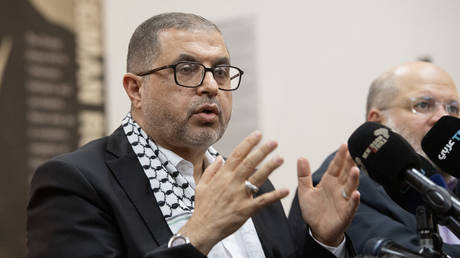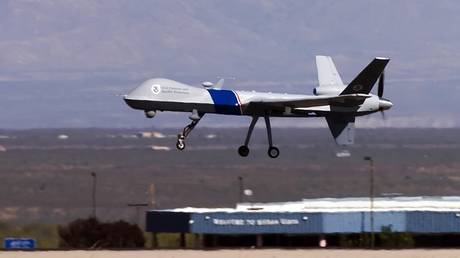
A leading member of the Palestinian organization’s politburo shares his thoughts on the planned US port in Gaza, internal conflicts, and more
Dr Basem Naim, a leading member of Hamas’ politburo, has told RT that the war in Gaza is being fought by a joint command of Palestinian groups in the besieged coastal enclave, not only Hamas.
He also discussed Hamas-Russia relations, regional alliances and internal Palestinian politics. Dr Naim raised concerns about the US plan to build a port in Gaza, which he warned could be used by the Israelis to commit further war crimes against the Palestinian people.
Since the beginning of the war in Gaza, little has been revealed by Western media regarding the coordination between Palestinian armed factions, which represent around a dozen groups based in the besieged territory.
In addition to this, most interviews with Hamas officials focus on “gotcha questions” and the events of October 7, without delving into substance or detail. This could be down to the fact that most Western nations consider Hamas to be a terrorist organization, along with every other major Palestinian political party/movement, the only exception being the mainstream branch of the Fatah party. However, throughout the rest of the world, most of these movements, including Hamas, enjoy open relations and dialogue.
The planned US Gaza sea port
The US is planning to build a sea port in Gaza, an idea that reportedly originally came from Israeli Prime Minister Benjamin Netanyahu, with the stated goal of facilitating the delivery of humanitarian supplies. While Dr Naim believes the port could allow aid to be delivered much more easily and directly, this would require a stable ceasefire, and that should be the main priority.
“Now, when it comes to this step, yes, on one hand we could see it as a positive step in the right direction. But, at the same time, why are they going this very long and complicated way? The shortest and easiest way is to oblige Israel to open all the ground crossings and to allow all the requirements of Gazans to come in and to allow all international bodies, including UNRWA, to work freely on the ground,“ he said.
“Second, which is more important, is to stop the aggression. How can aid be distributed inside the Gaza Strip while the Israelis continue firing? We are reading every day about people being killed while they are waiting for aid trucks to enter Gaza, especially in the north. All the international bodies have clearly stated, or declared, that no one can talk about satisfactory humanitarian aid without a ceasefire. Therefore, the first and most important step is to stop the firing.
“When it comes to how this affects the reality in the field, yes, there are ways that this port could be used for other purposes. Maybe it is not clear now, but there is something there,” continued Dr Naim.
When asked what other purposes he meant, he raised the following frightening prospect:
“I think this could be used for an American presence here. For example, this could be part of a long-term plan for control, by the Americans and the Israelis, of the seashore and of the landline from the west to the east.
“It could be, theoretically, a way to allow more people to leave the Gaza Strip under this inhuman situation on the ground. How can this aid port work without a partner on the ground? and who is the partner? and how will this partner work? How will it operate? Who will receive the aid and donations?
“I think there are a lot of questions which should be raised, and also we are in need of a lot of answers. But again, this could be seen as an urgent step to help the people and seen as a positive step. But we have to keep in mind that the other way of transferring aid is shorter and easier.”
Hamas and Palestinian political unification
The Palestinian attack on Israel that started the war on October 7, in which more than 1,000 people were killed and over 200 were taken hostage, is often linked solely to the armed wing of Hamas.
However, several other Palestinian armed movements including secular nationalists, Marxists and Islamic groups, all participated in the initial attack. These groups, from across the political spectrum, have also coordinated with Hamas in confronting Israel’s invasion of Gaza since late October. Inside the Gaza Strip, the groups collaborate under a unified command labeled the ‘Joint Room’. I asked Dr Naim about this and its political implications:
“The Joint Room was established a few years ago, shortly before the ‘Sword of Jerusalem’ battle in May of 2021. And it was a step in two primary ways: On one side, it allowed for organizing and to cooperate in the field, during the Israeli aggressions, while coordinating military operations with the different factions.
“On the other side, this helped create a new nucleus for Palestinian political unity. In other words, instead of coming from the top downwards, it was decided… why not go from the bottom upwards, by starting in the field, by cooperating together and working together?
“In the current battle [the ongoing war in Gaza], based on observations and some other information, I think it was very helpful to coordinate the military activities in different areas and at different times. Therefore, we have in some cases seen joint operations together from the Qassam Brigades with Saraya al-Quds [Palestinian Islamic Jihad armed wing], with the Mujahideen Brigades, and with many other groups.”
Hamas takes issue with a number of positions held by the Palestine Liberation Organization (PLO), which currently serves as the representative organization for the State of Palestine at the United Nations. However, there has been wide speculation surrounding the group’s desire to be reintegrated into the PLO. Regarding this issue, Dr Naim stated the following:
“I think Hamas has expressed its opinion or declared this, its stance is that we are looking to be a member of the PLO, but it has to be reformed before doing this because Hamas has a political vision, which was, decades ago, the same vision of the PLO. But unfortunately, the political vision of the PLO has been undermined repeatedly, by signing the Oslo agreement, by changing the PLO charter in 1996, and therefore, yes, we are looking to be members of the PLO, but changes have to be made.
“We need free, transparent and comprehensive elections at all levels, this means presidential elections, PLO national elections, PLC [Palestinian Legislative Council] elections, and this has to lead to choosing a new leadership. This new leadership has to sit together and come to a common national political project or national political agenda for the future of the Palestinian people everywhere, in the Gaza Strip, in the West Bank and in the diaspora.
“Until that could happen, we have proposed that we can have a temporary leadership, which can coordinate between the different factions, especially the two main big factions, Hamas and Fatah.”
Dr Naim stated, however, when questioned about the potential implementation of joint plans with the Ramallah-based Palestinian Authority (PA), such as a PA administrative role in a post-war Gaza, that the post-October 7 reality has to be taken into account.
When asked whether a similar deal to one that was almost implemented in 2017, by which the PA was on the cusp of taking over the civil administration in Gaza, he responded that “we have signed a lot of documents and agreements over the last 17 years, or 16 years, after the division [between the West Bank and Gaza’s administrations in 2007]. And all of these documents are satisfactory enough to lead to unity if the parties are serious, to implement agreements based upon national interest and this means excluding any external interventions.”
He also stated that Israel’s “fascist government will not accept any Palestinian State,” and Israel is now seeking a “so-called final solution plan… which means they seek to eliminate or to undermine Palestinian existence altogether, whether at the political level, at the human existence level, at the geographical level, at the regional religious level.”
“[Israel] openly seek total control over Al-Aqsa Mosque and the building of the [Jewish] temple there, along with the total judaization of Jerusalem, the annexation of the West Bank, the forceful displacement or expelling of Palestinians, especially from the West Bank, the separation between the Gaza Strip and the West Bank, the normalization with the Arab countries without solving the Palestinian conflict.”
Dr Naim says the threats made by Israel’s ministers, the prime minister himself, and others throughout the upper echelons of power within the Israeli military, political and security establishment, all have to be taken in context when preparing any future political vision within the Palestinian national movement.
As Israel and Hamas, through mediators, are currently in the process of negotiating a potential ceasefire that would lead to a prisoner exchange, I asked what the potential benefits are for freeing leaders from other Palestinian political parties during the exchange. Some of the names frequently noted have been the Fatah party’s Marwan Barghouti and the leader of the Popular Front for the Liberation of Palestine, Ahmad Sa’adat.
“We are looking for the release of all the Palestinian prisoners, regardless of their age, sex or political affiliation. But, yes, when it comes to specific names, we believe that the release of some leaders, not only from Hamas but also from other parties, will have a great impact on the internal Palestinian political dynamics.
“One of the problems we have today is that the internal political dynamics is poor for big leaders, who can see the big national goals and who can fight for big national goals and who can make some compromises for big national goals.
“Therefore, yes, it is, I think, very important, very crucial and very strategic to have some of the big national leaders from different factions freed from the Israeli jails.”
Hamas on Palestine-Russia relations
The position of Russia on the ongoing war between Gaza and Israel has been notable, with Moscow having hosted Hamas delegations. Dr Naim believes Russia can play a major role in both protecting Palestinians on the global stage and achieving accord between various intra-Palestinian factions.
“Russia is a superpower, and therefore they are very important and very crucial in the Palestinian-Israeli conflict. It is one of the permanent states on the Security Council, they are involved in different areas of this region and, therefore, they can help in a lot of cases politically and diplomatically.
“They are very important in protecting the Palestinians generally, and resistance in particular, when it comes to, to their seat on the Security Council and having the veto right in front of the American plans to undermine the Palestinians and their resistance.
“Russia is also important when it comes to Palestinian-Palestinian relations. They enjoy good relations with all Palestinian factions and this is something that is not present in a lot of cases.
“We can also say they have the same relations with all factions and this is also very helpful in helping achieve Palestinian unity. Also, when it comes to the existence or the presence of Russia in the region, Russia is here in Syria.
“I think, therefore, even in the battle itself, they might have the capability to affect it. Russia can also help Palestinians at the military level if it is feasible. I don’t know how much they can do, but I mean it is theoretically possible. Again, I think Russia is a big central country and it’s very important to the Palestinian-Israeli conflict.”
The US and the regional resistance alliance
Various regional factions, including Yemen’s Ansarallah (the Houthis), Lebanese Hezbollah, the Islamic Resistance in Iraq and Iran, have been providing support for Hamas in the current conflict with Israel in one way or another. Dr Naim believes that, with every such war, which have happened multiple times in recent years, this support grows and gradually coalesces into a cohesive resistance alliance.
“I think during this battle, it was clearer than during Saif al-Quds [the title Hamas gives to the May 2021 Gaza-Israel war]and Saif al-Quds made it clearer than before. Therefore, yes, we are witnessing the birth, or the creation of a full-blown picture of the resistance alliance, day after day. But the strategy was discussed years ago,” he added.
On the issue of the US and its role in the conflict in Gaza, Dr Naim said there were “a lot of American officers who are around the table in the war cabinet planning and implementing decisions.”
He also stated that “they secure military intelligence to get information from the Gaza Strip to help the Israelis to achieve their goals.”
“Most of the weapons being used to kill women and children in the Gaza Strip are American weapons,” he said, adding that the Americans are speaking about humanitarian aid as Palestinians face famine, but “fail to pressure Israel and they could end this all if they chose, but do not stop and are talking about a temporary ceasefire only for the purpose of the upcoming election, this is why their rhetoric shifts.”




